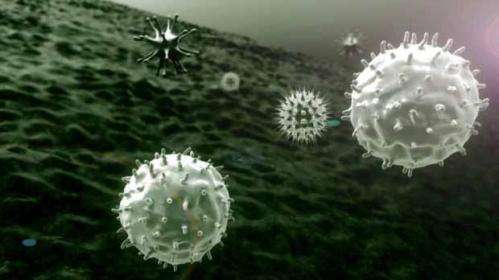New immune targeting cancer drugs show continued promise

Drugs that allow the immune system to recognise cancer and attack it are continuing to produce "exciting" results, say experts in the field.
The comments come after a series of studies were published in Nature this week, highlighting further progress in the field of immunotherapy.
One report contained details of a small (phase 1) clinical trial looking at bladder cancer carried out by Dr Thomas Powles from the Barts Cancer Institute, and colleagues.
Dr Powles pointed out that there have been no major advances for patients with advanced bladder cancer for 30 years, with chemotherapy still the main treatment option. Outcomes for patients with this stage of bladder cancer are poor.
However, there was a promising response among patients on the trial, which involved a drug that targets a protein, called PD-L1, which tumours use to trick the immune system.
Of the 68 patients who were given the drug, produced by Roche, more than half showed signs of effectiveness, and – in a minority – the drugs produced a long lasting response.
Professor Peter Johnson, Cancer Research UK's chief clinician, said: "We're seeing a lot of very exciting results from these new treatments using the immune system. This study in bladder cancer is further proof of the power of this approach, and it's really good to find a new treatment for a type of cancer that we've been struggling to make progress with for many years.
"Cancer can only grow by finding a way to escape detection by the immune system. One way it does this is to trigger a shut-off switch on immune cells when they get close to the tumour. This new treatment blocks the cancer cell's ability to use this switch, allowing the immune system to recognise and destroy the cancer".
Another study in the area by Dr Roy Herbst, from the Yale Cancer Centre in the US, demonstrated that such treatments can produce responses in patients with other cancers, including lung and kidney cancers, and melanoma skin cancers.
Dr Herbst told the BBC: "This is a new paradigm in cancer. Immunotherapy for cancer has opened up an entirely new modality for treatment of the disease alongside chemotherapy, radiotherapy and surgery.
"Now we have immunotherapy and it is here to stay," he said, "the challenge for clinicians is seeing how it fits alongside those others."
Three further papers also published in the same issue of Nature, made further progress in understanding exactly how the immune system recognised cancer after treatment with the drugs, reinforcing research published a week earlier that experts called a "huge breakthrough".
More information:
"MPDL3280A (anti-PD-L1) treatment leads to clinical activity in metastatic bladder cancer," doi:10.1038/nature13904
"PD-1 blockade induces responses by inhibiting adaptive immune resistance," doi:10.1038/nature13954
"Predicting immunogenic tumour mutations by combining mass spectrometry and exome sequencing." doi:10.1038/nature14001
"Checkpoint blockade cancer immunotherapy targets tumour-specific mutant antigens." doi:10.1038/nature13988
Provided by Cancer Research UK